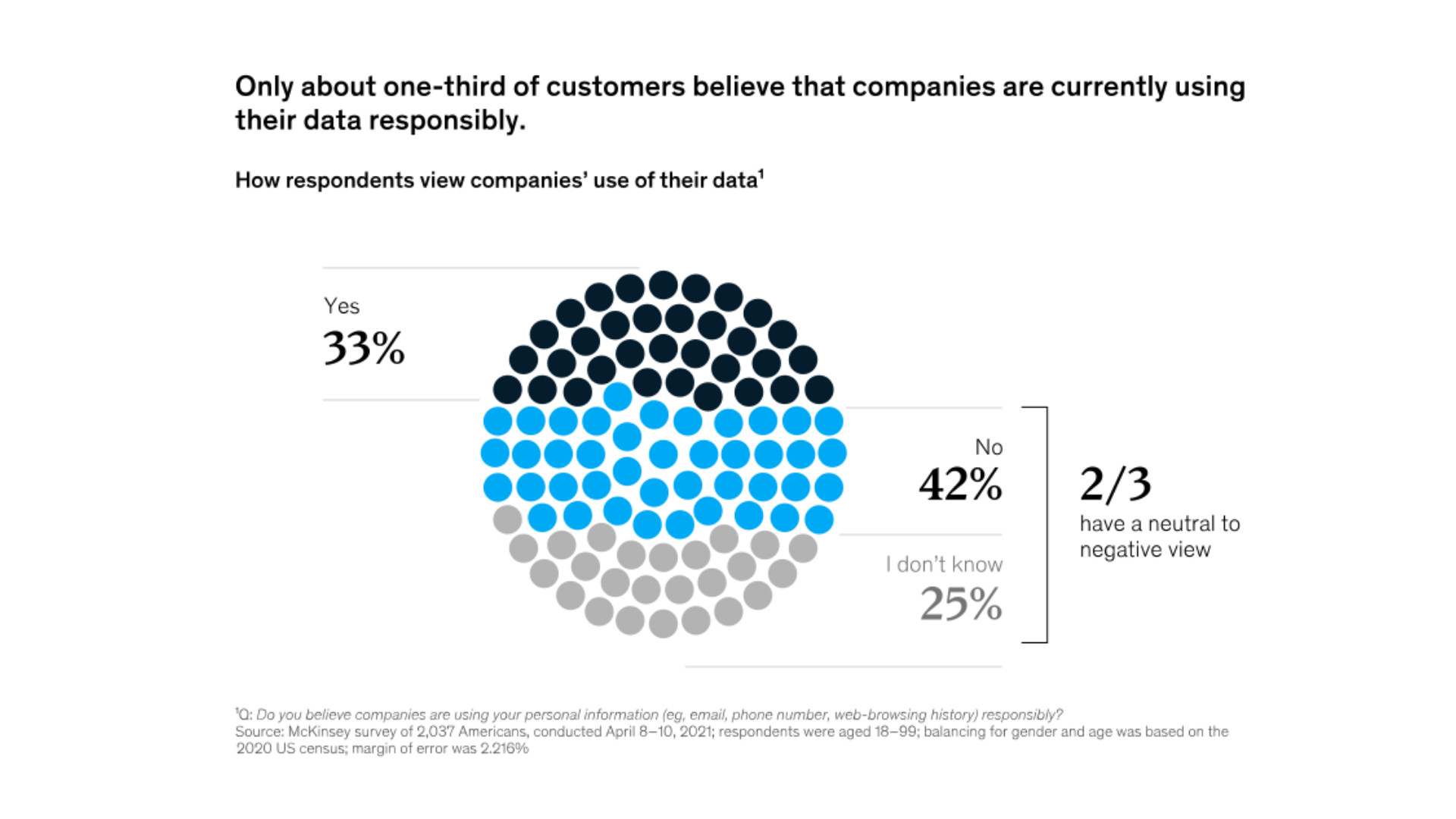Leveraging Digital Marketing in the Privacy-First World
Discover how to maintain a successful marketing campaign while respecting your audience's privacy needs.
Data tracking technology has advanced significantly since the early days of online tracking when cookies—small bits of code embedded into website browsers—were used to collect user data and build a profile based on their online activity. This enabled advertisers to target ads more effectively by tracking user behavior and placing ads according to individual interests.
Over the years, tracking technology has become increasingly sophisticated. Today’s digital marketers use various methods to collect user data, including cookies, web beacons, and embedded scripts.
The Rise of Data Privacy Awareness
As individuals interact more frequently with digital technologies, the importance of personal data protection has become increasingly apparent. Events such as the Cambridge Analytica revelation have demonstrated that data stored online by companies may be accessible to a far wider audience than intended.
As a result, many users have become aware of the need for robust protocols and procedures within companies regarding collecting, storing, and using user information. Furthermore, lawmakers worldwide have sought to respond to these events by introducing tighter laws and regulations on data security to make it harder for third parties to obtain access.
Ultimately, we are now living in an era where data privacy is paramount, and safeguarding against potential breaches must remain a top priority for businesses and individuals alike. Research by McKinsey suggests that only around 33 percent of Americans believe that companies are using their personal data responsibly. As a result of growing concern around data usage, government regulations have begun to limit the use of customer data; the European Union’s GDPR was the first in 2018, but others—including the CCPA, the California Privacy Rights Act (CPRA), and the Delaware Online Privacy and Protection Act—have followed.

The Global Privacy Laws that Govern Digital Marketing Practices
With the rapid expansion of digital marketing practices, more countries and jurisdictions are beginning to enact laws that govern how companies use customer data. In addition to General Data Protection Regulation (GDPR), other countries have also implemented laws that restrict how companies can collect, process and store customer data.
All of these laws have several similarities, such as the requirement for companies to disclose what data is being collected and how it is being used. In addition, they also require that customers be able to access their data and exercise certain rights over their information, including the right to have their data deleted or amended.
The landscape of international privacy laws is ever-evolving, as more countries begin to recognize the importance of protecting consumer data.
The Impact of GDPR on New-Age Marketing
At first glance, GDPR might seem intimidating, especially for small businesses or people who are solo practitioners. In reality, though, marketing professionals only need to focus on three main things: data permission, data access, and data focus.
Let's look at each one of these:
Data Permission
The GDPR has created new standards for data permission and enhanced user control over their personal information. It requires organizations to identify, document, and respect the wishes of individuals on how their data is used. Failure to get explicit permission from individuals before using or processing any of their personal data risks hefty fines. This emphasizes the need for organizations to understand exactly what they are allowed to do with personal data, taking into consideration the individual's rights and interests. Firms must also take all reasonable measures to guarantee that these rights are safeguarded, leaving no doubt as to where an individual stands regarding their rights over their data. Taking an overly conservative approach and getting justifiable consent certainly appears to be the best way forward in light of such stringent regulations.
In practice, it means that leads, customers, and partners have to confirm that they want to be contacted physically. Companies need to seek permission from their prospects and customers actively, not just assume they have it. This lets marketers know that the prospects or customers want to be contacted.
Only when it comes to "refer a friend" programs should you be careful. Refer-a-friend programs usually work when a prospect or customer enters the email address of a friend in order to claim an offer (i.e. a discount, sale, bonus, etc). Once they put in a friend's email address, the company sends an email to that "friend" without getting their explicit permission to do so. Most of the time, these emails are "notifications" and not advertising.
As long as this information is not stored or processed, it is GDPR-compliant.
But you are breaking the law if you store the data and use it for marketing communications.
Data Access
The “right to be forgotten” is one of the EU Justice Court's most talked-about decisions. It gives people the right to have out-of-date or incorrect personal information removed. In some cases, companies like Google had already done this when they were forced to remove pages from their search engine results to conform to the law.
In line with their "right to be forgotten," GDPR gives people a way to have more control over how their data is collected and used, including the ability to access or delete it.
It will be the marketers’ responsibility to ensure the users can easily access their data and take away their consent for its use.
In practice, this can be as easy as putting an "unsubscribe" link in your email marketing template and linking to the customer's profile, where they can change their email preferences.
Data Focus
As marketers, understanding our legal obligations should always be top of mind. In the wake of GDPR guidelines, it's more important than ever to ensure that we consider what kind of personal data we are asking for - and why! While there can be many valid reasons for needing additional information from customers or clients, we must be aware that any data collected must fall under a lawful basis established by GDPR. It is essential, therefore, to understand the goals of our marketing campaigns before requesting such information from customers to act ethically and stay compliant.
A Customer-Centric Approach to Marketing in a World that Values Privacy
These days, customers are more aware of their data privacy rights and the risks associated with sharing personal information on the internet. As a result, companies need to take a customer-centric approach when it comes to digital marketing practices to build trust and loyalty among their consumers. This means taking steps such as using opt-in forms, only collecting the data that is absolutely necessary, and giving customers control over what information they share.
Companies should also look at ways to provide customers with more transparency, such as by providing clear descriptions of how customer data is being used and offering easy ways for them to access and amend their personal information. Making sure that customer privacy is a priority in all digital marketing practices is essential for a company’s success in the modern, data-driven world.
By understanding and adhering to the laws that govern digital marketing practices, companies can ensure they are providing a safe and secure environment for their customers while still generating quality leads. This customer-centric approach will help them build trust and loyalty in their brand, which is essential for any business that wants to succeed in the digital age.
At the same time, companies should also be aware of the potential risks associated with collecting personal data from customers. As the regulations evolve, companies must remain vigilant and ensure they are following best practices when it comes to protecting customer data. This includes implementing appropriate technical and organizational measures to protect personal information, such as encryption and pseudonymization of the data whenever possible. Companies must also have robust processes in place to address any potential data breaches that may occur.
Final Word
The world is changing, and with it, the way customers view privacy. They are more likely to share personal information if they feel like they are in control of how that information is used. As a marketer, you need to find ways to build trust with your customers and give them a sense of ownership over their data. This means taking a customer-centric approach to marketing that puts the customer first. There are many ways to do this, but some key strategies include being transparent about what you’re doing with customer data and giving people choices about how they want to interact with your brand.
You can also show customers that you respect their privacy by not selling or sharing their information without consent. -Building trust takes time and effort, but it’s worth it because customers who trust you will be more likely to buy from you. So make sure you put the needs of your customers first and focus on building long-term relationships based on mutual respect and understanding. How has your company adapted its marketing strategy in light of changes in consumer attitudes toward privacy?
